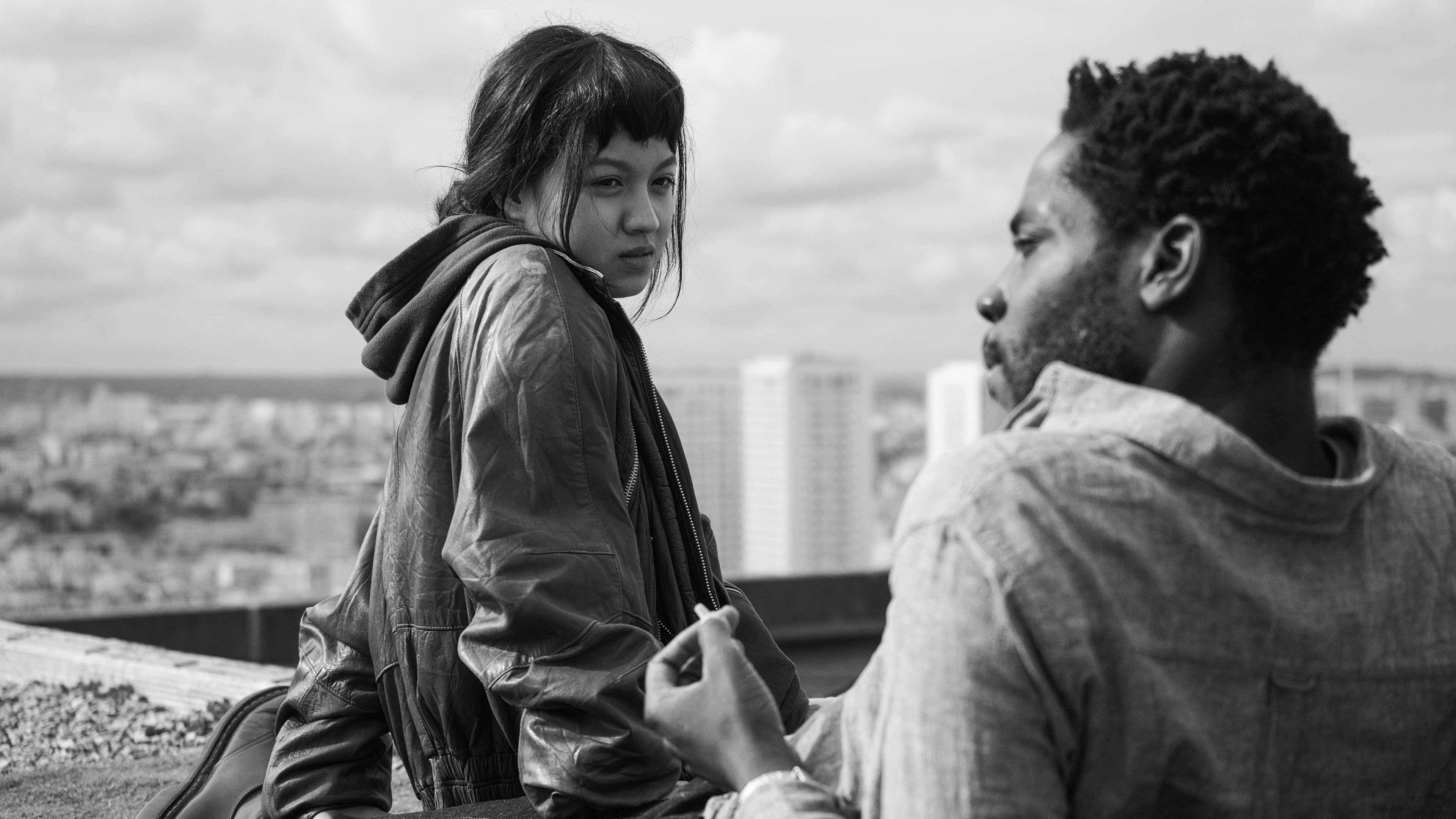"Paris, 13th District" review — love and romance in the digital age
“I love you.”
Paris, 13th District begins with a string of quiet, slow aerial pans over the Parisian neighbourhood at the centre of its narrative. There’s the sound of a soft wind followed by a distant car horn. There’s a conversation somewhere on the streets below. The camera drifts past a few windows revealing small moments of the many who call the 13th arrondissement of Paris home before settling in the interior of an apartment. We find two lovers caught in a post-coital moment. The woman sings karaoke, and the man searches for a yogurt. They exchange a few pieces of flirtatious pieces of dialogue before the eye of the film leaves them in peace and returns to its sweeping shots of the City of Lights. Then the sun begins to rise as Rone’s electronic pop-ish score plays its first notes. We flashback only a few days before and a title card reads “It Began Like This.”
Directed by multi-César Award-winning filmmaker Jacques Audiard and based on a handful of graphic novels by American cartoonist Adrian Tomine, Paris, 13th District (also known under its French title Les Olympiades) follows three young people living and working in the titular district. The film’s story begins when Camile (Makita Samba) meets Émilie (Lucie Zhang) for the first time. He works in real estate as he struggles to finish his doctorate, she works an unfulfilling job at a call centre. They start their relationship as simply roommates, although they swiftly become lovers with very little work in between. About half an hour into the runtime, Nora (Noémie Merlant) enters the fray. She’s come to Paris to study law. But when she’s mistaken for camgirl Amber Sweet (Jehnny Beth), she leaves academia and winds up working with Camile.
From that short description of the film’s story, it is clear that Paris, 13th District has quite a few moving parts. It’s almost natural coming as it pulls from so many parts of Tomine’s work that have very little to do with each other except for sharing a creator. These fragments of a story, unfortunately, can’t quite define their relationship with one another. They are never separate enough for the film to function as a sort of anthology piece but are also not cohesive enough to form a singular narrative. The character of Camile interacts quite heavily with both Nora and Émilie and develops romantic and sexual relationships with both of them, but the film isn’t content to define either of Camile’s love interests by their relationship with him — in fact, the real lead of the film is Émilie — which is a perfectly noble choice. However, that also means that Émilie and Nora stand awkwardly separate from each other.
 |
| Noémie Merlant and Makita Samba in Paris, 13th District. Photo: Page 114. |
Newcomer Lucie Zhang gives a terrific performance as Émilie. She exudes such fantastic energy through her character. Zhang finds humour in her moments with Samba, great drama within Émilie’s familial struggles, and comes out of it a strong, interesting character. A particularly evocative moment comes about an hour into the film when Émilie dances freely and wildly through the restaurant where she works. Samba is quite charming as Camile. Merlant’s performance is also quite excellent even if her character feels too divided between her relationship with Camile and with Amber. Beth rounds out the cast as Amber Sweet, whose role in this film is never quite understood by the screenwriters. While Beth’s performance is serviceable, she never feels as cleanly integrated into the drama as I would have liked.
The filmmaking is reminiscent of many classic French New Wave films, but with a distinctly contemporary touch. Audiard’s craft evokes memories of Varda, Malle, and Godard. Paul Guilhaume’s black-and-white digital cinematography makes for a compelling blend of the new and old. The film’s script on the other hand, for all its charms and interesting character moments, doesn’t present itself as being anything particularly interesting. Written by Audiard with Léa Mysius and Portrait of a Lady on Fire (2019) filmmaker Céline Sciamma, the film strives to be a forward-thinking film about romance, intimacy, and sex in the digital age but manages to say nothing of substance about the issue. While the themes and ideas it presents are intriguing, Paris, 13th District doesn’t have enough breadth nor depth in its narrative to bring anything from them.
In the end, Paris, 13th District has its charms. With some excellent filmmaking on display and a trio of strong leading performances to boot, the film is certainly not without merit. This is perhaps why I find the film such a frustrating experience. It has these brilliantly captivating moments and interesting character beats but never seems to deliver on its own intentions. There is a promise of a smart, cohesive, thoughtful, sexy version of this film buried somewhere within its messy, conflicting storylines. But Paris, 13th District is not the film it desires itself to be and the result is a project that ultimately feels quite hollow and dissatisfying.
Score: 2.5
Paris, 13th District is playing in select theatres and available on VOD.
Directed by Jacques Audiard
Written by Céline Sciamma, Léa Mysius, Jacques Audiard
Starring Lucie Zhang, Makita Samba, Noémie Merlant, Jehnny Beth
Released 15 April 2022 (limited)
106 minutes




Comments
Post a Comment